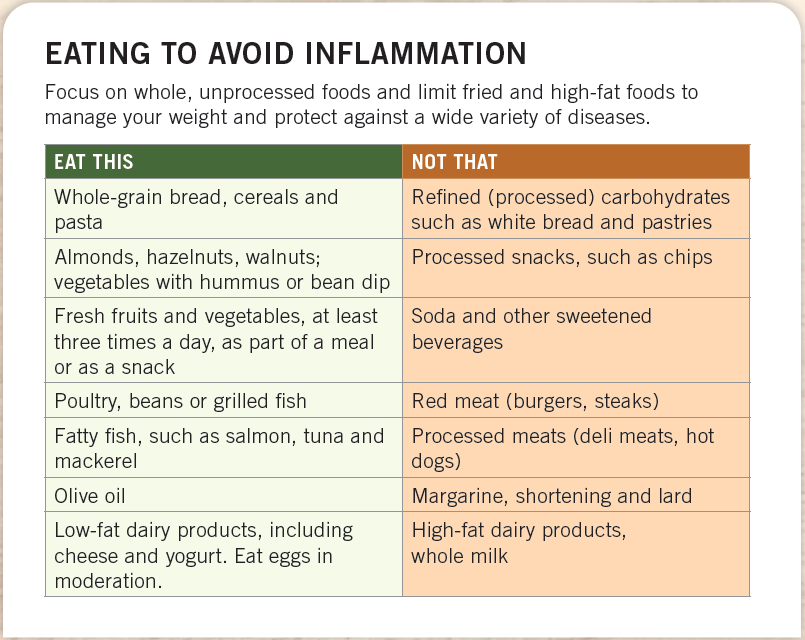There’s no miracle diet, but foods that fight inflammation can protect joints—and also ward off many types of disease.
Arthritis—swelling and tenderness of a joint—is a painful daily experience for many. It can have a variety of causes and a range of treatments, including medication and physical therapy.
Now, emerging data indicates that avoiding inflammatory foods and consuming anti-inflammatory foods has benefits for arthritis sufferers.
What is an “anti-inflammatory” diet? It emphasizes foods we’ve long known to be beneficial to health: fruits, vegetables, lean proteins, whole grains, healthy fats.
An anti-inflammatory way of eating follows what’s known as the Mediterranean diet, which is based on the traditional diet of people in areas bordering the Mediterranean Sea. However, an anti-inflammatory diet knows no geographical limits and can work with any culture’s cuisine. (See the “Eating to Avoid Inflammation” chart, below.)

An anti-inflammatory diet protects against heart disease, diabetes and many types of cancer. It can help arthritis sufferers (whether they have osteoarthritis or rheumatoid arthritis) because it can inhibit inflammation that attacks joint tissue and can lead to swelling, cartilage and bone damage, and muscle loss.
Focusing on healthy foods also helps with weight management—another key issue for people with arthritis, since extra weight places added stress on joints.
What is Inflammation?
Inflammation is the immune system’s response to an irritant as chemicals from white blood cells enter the blood.
Acute inflammation is short-term (hours or days). It begins after an injury to the body and is characterized by one or more of these symptoms: heat, swelling, redness, pain or loss of function.
Chronic inflammation can last for months or years and occurs when the immune system fights against the body’s own blood cells by mistake. Diseases affected by chronic inflammation include rheumatoid arthritis, psoriasis, myocarditis (heart inflammation), nephritis (inflammation of kidneys), and inflammatory bowel diseases like Crohn’s disease or ulcerative colitis.
A physician can diagnose a possible inflammatory disease by doing a medical history, physical exam and tests such as X-rays and blood tests.
Our team of registered dietitians at Cooperman Barnabas Medical Center offers individualized and group nutrition counseling programs for those struggling with a medical condition or who want to take an active role in their health and well-being. To learn more, call 973-322-7007.